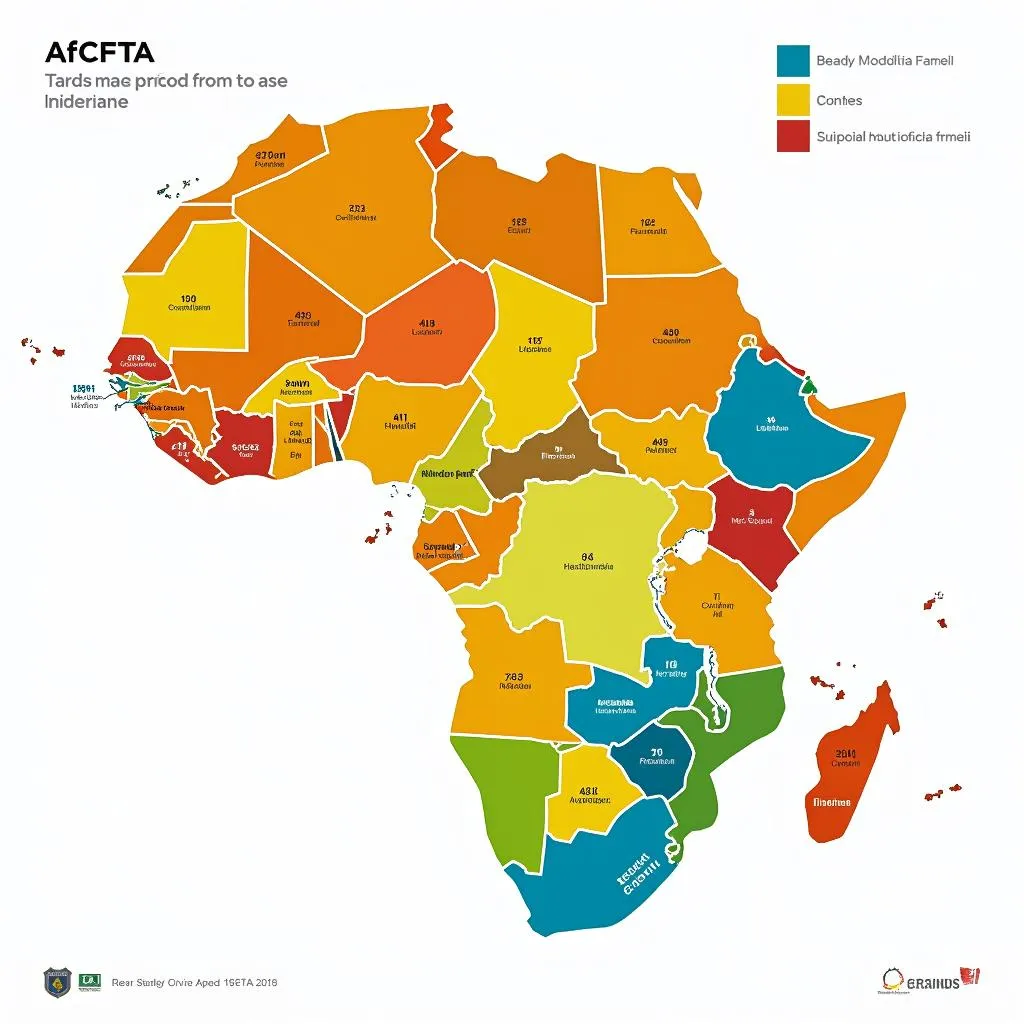Unlocking Africa’s Potential: The African Continental Free Trade Area (AfCFTA) Explained
The African Continental Free Trade Area (AfCFTA) is poised to revolutionize trade and investment in Africa. With the ambitious goal of creating a single market for goods and services across the continent, the AfCFTA promises to unlock unprecedented economic opportunities for Africa’s 1.3 billion people. This landmark agreement, ratified by the majority of African Union member states, aims to boost intra-African trade, attract foreign investment, and propel the continent towards a brighter future.
Understanding the AfCFTA: A Game-Changer for Africa
At its core, the AfCFTA seeks to eliminate tariffs and non-tariff barriers to trade between African countries. By reducing trade costs and simplifying customs procedures, the agreement aims to make it easier for businesses across the continent to trade with each other. This, in turn, is expected to boost intra-African trade, which currently lags behind other regions of the world.
 Map showing tariff reductions under AfCFTA
Map showing tariff reductions under AfCFTA
Benefits of the AfCFTA: A Pathway to Economic Transformation
The potential benefits of the AfCFTA are far-reaching and transformative. By creating a larger and more integrated market, the agreement is expected to:
- Boost Economic Growth: Increased trade is projected to stimulate economic activity, creating new jobs and boosting incomes across the continent.
- Attract Foreign Investment: A larger and more predictable market will make Africa a more attractive destination for foreign direct investment, leading to new industries and technologies.
- Enhance Industrialization: By facilitating the development of regional value chains, the AfCFTA can support industrialization and the production of higher-value goods.
- Improve Infrastructure: The need to facilitate trade is likely to drive investments in transportation, logistics, and other critical infrastructure.
- Empower Women and Youth: By creating new economic opportunities, the AfCFTA has the potential to empower women and youth, who are often marginalized in the formal economy.
The Role of the IAS Parliament in Supporting the AfCFTA
The International Association of Students in Economics and Commercial Sciences (IAS Parliament) plays a crucial role in supporting the implementation and success of the AfCFTA. By:
- Raising Awareness: Educating students and young professionals about the benefits and opportunities presented by the AfCFTA.
- Building Capacity: Providing training and development programs to equip young Africans with the skills and knowledge needed to thrive in the new trade environment.
- Facilitating Dialogue: Creating platforms for dialogue and collaboration between governments, businesses, and civil society organizations to ensure the inclusive implementation of the AfCFTA.
- Promoting Innovation: Encouraging young entrepreneurs to develop innovative solutions that can harness the potential of the AfCFTA.
Overcoming Challenges and Realizing the Vision
While the AfCFTA presents significant opportunities, it also faces challenges that must be addressed to fully realize its potential:
- Addressing Non-Tariff Barriers: Beyond tariffs, addressing non-tariff barriers such as bureaucratic delays, infrastructure bottlenecks, and regulatory inconsistencies is crucial for seamless trade.
- Strengthening Institutional Capacity: Building the capacity of customs authorities, regulatory bodies, and other relevant institutions is essential for the effective implementation of the agreement.
- Promoting Inclusiveness: Ensuring that the benefits of the AfCFTA reach all segments of society, including small and medium-sized enterprises (SMEs), women, and youth, is paramount.
 Diverse group of African entrepreneurs discussing business opportunities
Diverse group of African entrepreneurs discussing business opportunities
Conclusion: A Shared Vision for a Prosperous Africa
The African Continental Free Trade Area represents a historic opportunity to unlock Africa’s vast economic potential and drive sustainable development across the continent. By fostering greater intra-African trade, attracting investment, and promoting industrialization, the AfCFTA has the power to transform Africa’s economic landscape and create a brighter future for generations to come. The IAS Parliament, through its commitment to education, capacity building, and advocacy, is committed to supporting the successful implementation of the AfCFTA and ensuring that its benefits reach all corners of the continent.
FAQs about the African Continental Free Trade Area (AfCFTA)
1. When did the AfCFTA come into effect?
The AfCFTA officially entered into force on May 30, 2019, after being ratified by the minimum number of African Union member states.
2. How many countries are party to the AfCFTA?
As of today, 54 out of 55 African Union member states have signed the AfCFTA agreement, and a significant majority have ratified it.
3. What are the key objectives of the AfCFTA?
The AfCFTA aims to create a single continental market for goods and services, boost intra-African trade, attract foreign investment, and promote industrialization and economic diversification in Africa.
4. How will the AfCFTA benefit consumers?
By reducing tariffs and promoting competition, the AfCFTA is expected to lead to lower prices, greater product choices, and improved quality for consumers across Africa.
5. What is the role of the private sector in the AfCFTA?
The private sector is considered a key driver of the AfCFTA’s success. Businesses are encouraged to leverage the opportunities created by the agreement to expand their operations, create new jobs, and contribute to Africa’s economic transformation.
 Modern factory in Africa with workers operating machinery
Modern factory in Africa with workers operating machinery
Get in touch with us for further inquiries:
Phone Number: +255768904061
Email: kaka.mag@gmail.com
Address: Mbarali DC Mawindi, Kangaga, Tanzania
Our dedicated customer support team is available 24/7 to assist you.


